Evaluating Kant's Argument Against Lying: A Philosophical Essay
VerifiedAdded on 2023/06/08
|7
|2583
|85
Essay
AI Summary
This essay delves into Immanuel Kant's argument that lying is always morally wrong, examining the philosophical underpinnings of this claim within his broader moral framework. It explores Kant's belief in the intrinsic value of human dignity and the importance of truthfulness in maintaining a trustworthy society. The essay considers criticisms of Kant's absolute stance, particularly in situations where lying might prevent harm. It analyzes Kant's concept of duty and its relation to the right to truth, as well as the potential societal disadvantages of unconditional truthfulness. The essay also discusses the role of good will and the challenges of applying Kant's high ideals in practical, unforeseen circumstances, ultimately concluding that while Kant's position is philosophically consistent, its practicality is debatable in certain real-world scenarios. Desklib provides a platform for students to explore more solved assignments and past papers.
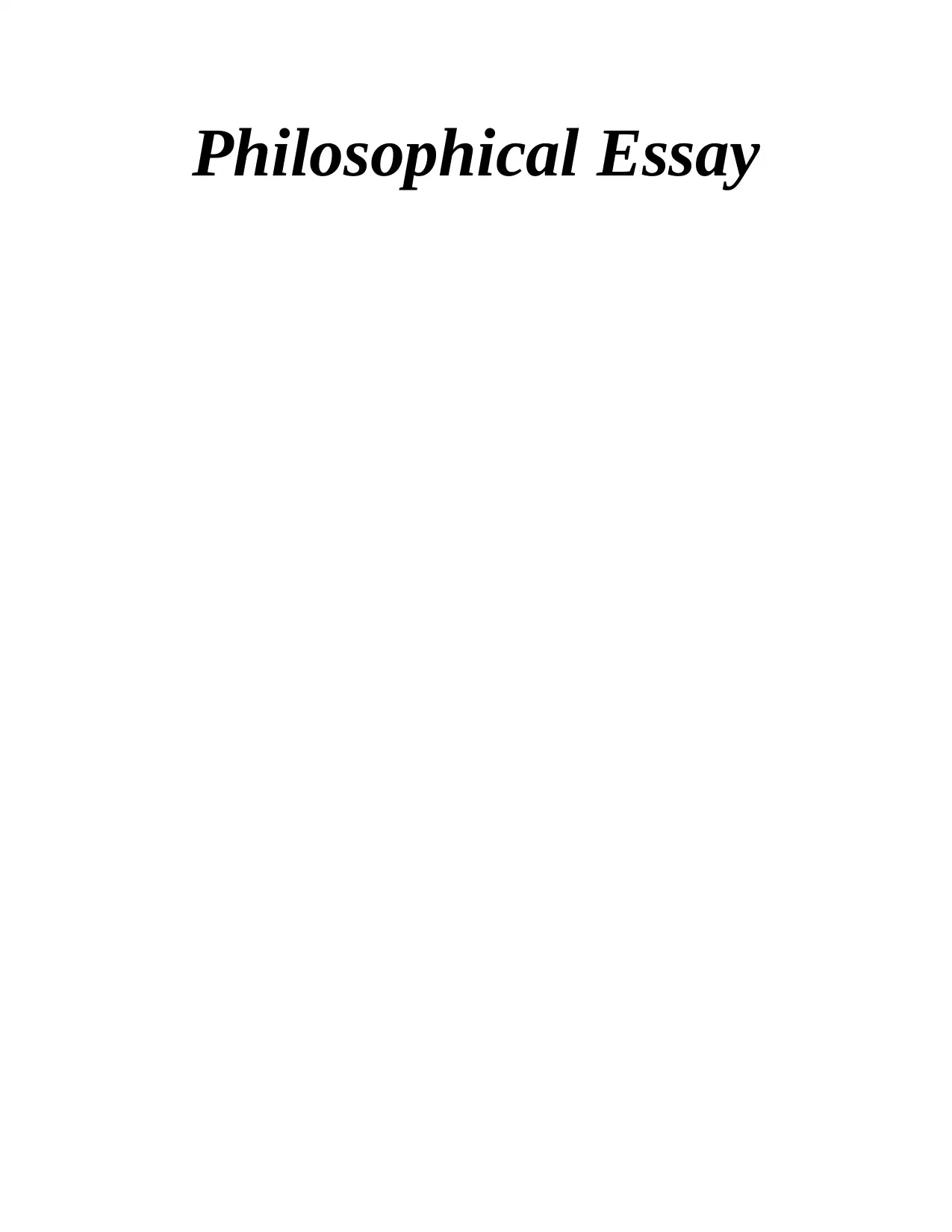
Philosophical Essay
Paraphrase This Document
Need a fresh take? Get an instant paraphrase of this document with our AI Paraphraser
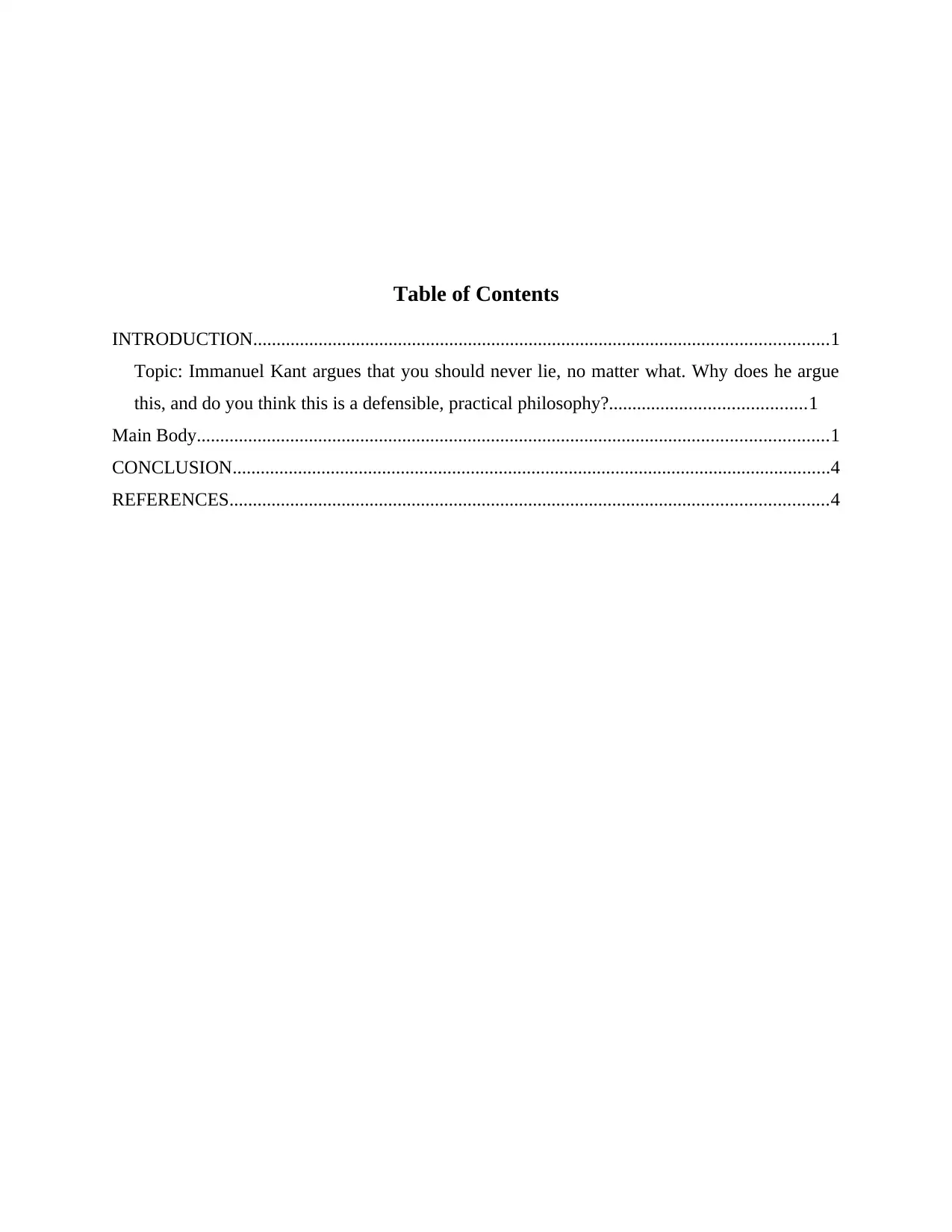
Table of Contents
INTRODUCTION...........................................................................................................................1
Topic: Immanuel Kant argues that you should never lie, no matter what. Why does he argue
this, and do you think this is a defensible, practical philosophy?..........................................1
Main Body.......................................................................................................................................1
CONCLUSION................................................................................................................................4
REFERENCES................................................................................................................................4
INTRODUCTION...........................................................................................................................1
Topic: Immanuel Kant argues that you should never lie, no matter what. Why does he argue
this, and do you think this is a defensible, practical philosophy?..........................................1
Main Body.......................................................................................................................................1
CONCLUSION................................................................................................................................4
REFERENCES................................................................................................................................4
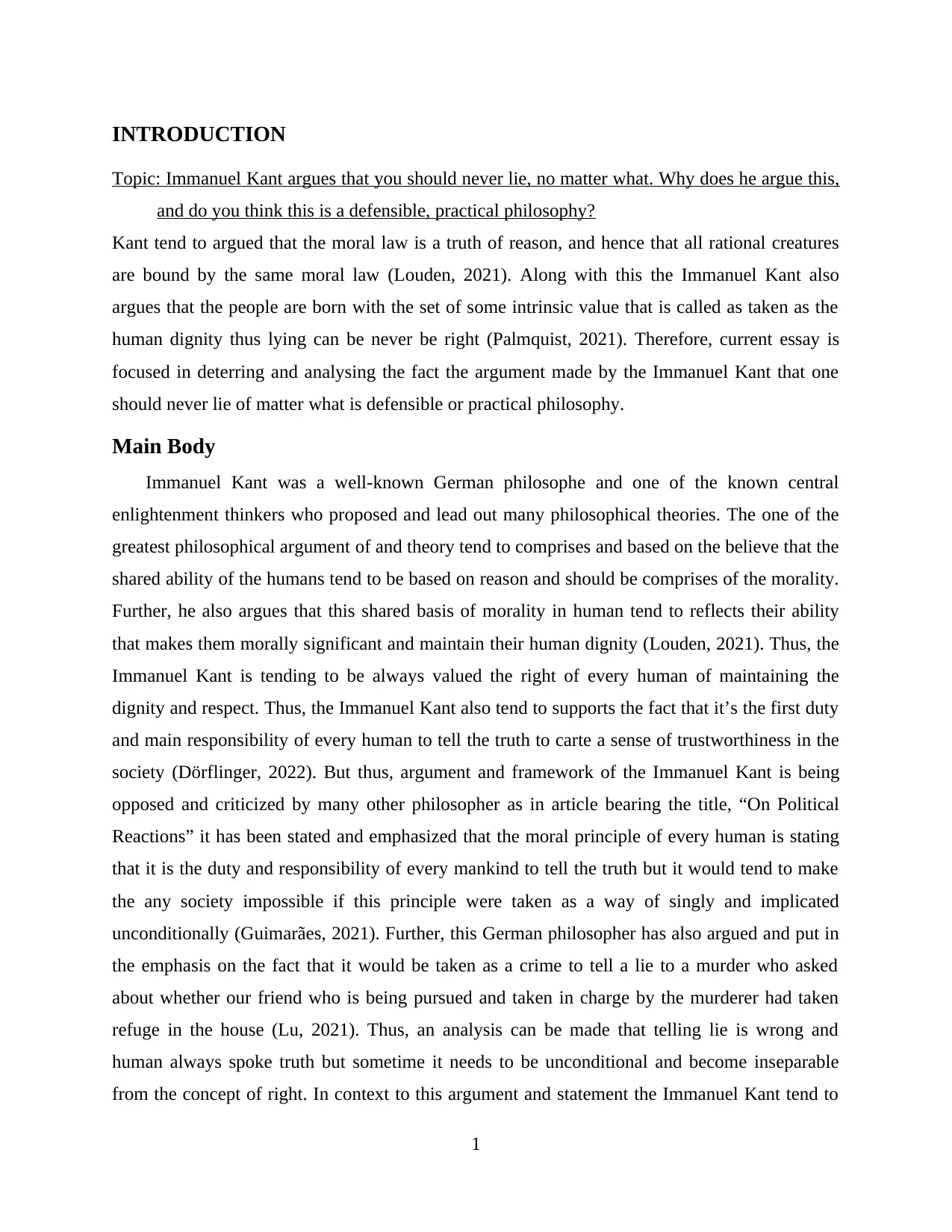
INTRODUCTION
Topic: Immanuel Kant argues that you should never lie, no matter what. Why does he argue this,
and do you think this is a defensible, practical philosophy?
Kant tend to argued that the moral law is a truth of reason, and hence that all rational creatures
are bound by the same moral law (Louden, 2021). Along with this the Immanuel Kant also
argues that the people are born with the set of some intrinsic value that is called as taken as the
human dignity thus lying can be never be right (Palmquist, 2021). Therefore, current essay is
focused in deterring and analysing the fact the argument made by the Immanuel Kant that one
should never lie of matter what is defensible or practical philosophy.
Main Body
Immanuel Kant was a well-known German philosophe and one of the known central
enlightenment thinkers who proposed and lead out many philosophical theories. The one of the
greatest philosophical argument of and theory tend to comprises and based on the believe that the
shared ability of the humans tend to be based on reason and should be comprises of the morality.
Further, he also argues that this shared basis of morality in human tend to reflects their ability
that makes them morally significant and maintain their human dignity (Louden, 2021). Thus, the
Immanuel Kant is tending to be always valued the right of every human of maintaining the
dignity and respect. Thus, the Immanuel Kant also tend to supports the fact that it’s the first duty
and main responsibility of every human to tell the truth to carte a sense of trustworthiness in the
society (Dörflinger, 2022). But thus, argument and framework of the Immanuel Kant is being
opposed and criticized by many other philosopher as in article bearing the title, “On Political
Reactions” it has been stated and emphasized that the moral principle of every human is stating
that it is the duty and responsibility of every mankind to tell the truth but it would tend to make
the any society impossible if this principle were taken as a way of singly and implicated
unconditionally (Guimarães, 2021). Further, this German philosopher has also argued and put in
the emphasis on the fact that it would be taken as a crime to tell a lie to a murder who asked
about whether our friend who is being pursued and taken in charge by the murderer had taken
refuge in the house (Lu, 2021). Thus, an analysis can be made that telling lie is wrong and
human always spoke truth but sometime it needs to be unconditional and become inseparable
from the concept of right. In context to this argument and statement the Immanuel Kant tend to
1
Topic: Immanuel Kant argues that you should never lie, no matter what. Why does he argue this,
and do you think this is a defensible, practical philosophy?
Kant tend to argued that the moral law is a truth of reason, and hence that all rational creatures
are bound by the same moral law (Louden, 2021). Along with this the Immanuel Kant also
argues that the people are born with the set of some intrinsic value that is called as taken as the
human dignity thus lying can be never be right (Palmquist, 2021). Therefore, current essay is
focused in deterring and analysing the fact the argument made by the Immanuel Kant that one
should never lie of matter what is defensible or practical philosophy.
Main Body
Immanuel Kant was a well-known German philosophe and one of the known central
enlightenment thinkers who proposed and lead out many philosophical theories. The one of the
greatest philosophical argument of and theory tend to comprises and based on the believe that the
shared ability of the humans tend to be based on reason and should be comprises of the morality.
Further, he also argues that this shared basis of morality in human tend to reflects their ability
that makes them morally significant and maintain their human dignity (Louden, 2021). Thus, the
Immanuel Kant is tending to be always valued the right of every human of maintaining the
dignity and respect. Thus, the Immanuel Kant also tend to supports the fact that it’s the first duty
and main responsibility of every human to tell the truth to carte a sense of trustworthiness in the
society (Dörflinger, 2022). But thus, argument and framework of the Immanuel Kant is being
opposed and criticized by many other philosopher as in article bearing the title, “On Political
Reactions” it has been stated and emphasized that the moral principle of every human is stating
that it is the duty and responsibility of every mankind to tell the truth but it would tend to make
the any society impossible if this principle were taken as a way of singly and implicated
unconditionally (Guimarães, 2021). Further, this German philosopher has also argued and put in
the emphasis on the fact that it would be taken as a crime to tell a lie to a murder who asked
about whether our friend who is being pursued and taken in charge by the murderer had taken
refuge in the house (Lu, 2021). Thus, an analysis can be made that telling lie is wrong and
human always spoke truth but sometime it needs to be unconditional and become inseparable
from the concept of right. In context to this argument and statement the Immanuel Kant tend to
1
⊘ This is a preview!⊘
Do you want full access?
Subscribe today to unlock all pages.

Trusted by 1+ million students worldwide
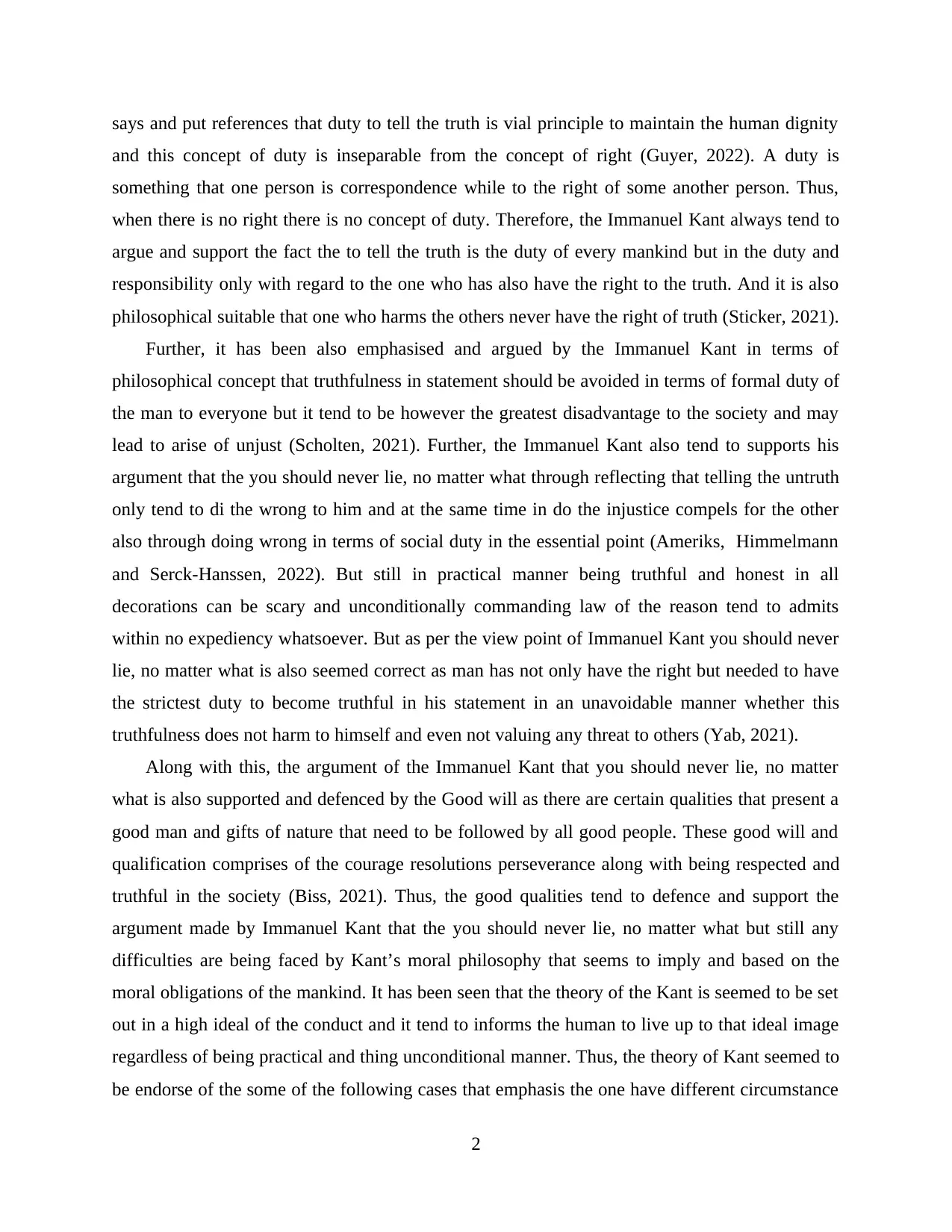
says and put references that duty to tell the truth is vial principle to maintain the human dignity
and this concept of duty is inseparable from the concept of right (Guyer, 2022). A duty is
something that one person is correspondence while to the right of some another person. Thus,
when there is no right there is no concept of duty. Therefore, the Immanuel Kant always tend to
argue and support the fact the to tell the truth is the duty of every mankind but in the duty and
responsibility only with regard to the one who has also have the right to the truth. And it is also
philosophical suitable that one who harms the others never have the right of truth (Sticker, 2021).
Further, it has been also emphasised and argued by the Immanuel Kant in terms of
philosophical concept that truthfulness in statement should be avoided in terms of formal duty of
the man to everyone but it tend to be however the greatest disadvantage to the society and may
lead to arise of unjust (Scholten, 2021). Further, the Immanuel Kant also tend to supports his
argument that the you should never lie, no matter what through reflecting that telling the untruth
only tend to di the wrong to him and at the same time in do the injustice compels for the other
also through doing wrong in terms of social duty in the essential point (Ameriks, Himmelmann
and Serck-Hanssen, 2022). But still in practical manner being truthful and honest in all
decorations can be scary and unconditionally commanding law of the reason tend to admits
within no expediency whatsoever. But as per the view point of Immanuel Kant you should never
lie, no matter what is also seemed correct as man has not only have the right but needed to have
the strictest duty to become truthful in his statement in an unavoidable manner whether this
truthfulness does not harm to himself and even not valuing any threat to others (Yab, 2021).
Along with this, the argument of the Immanuel Kant that you should never lie, no matter
what is also supported and defenced by the Good will as there are certain qualities that present a
good man and gifts of nature that need to be followed by all good people. These good will and
qualification comprises of the courage resolutions perseverance along with being respected and
truthful in the society (Biss, 2021). Thus, the good qualities tend to defence and support the
argument made by Immanuel Kant that the you should never lie, no matter what but still any
difficulties are being faced by Kant’s moral philosophy that seems to imply and based on the
moral obligations of the mankind. It has been seen that the theory of the Kant is seemed to be set
out in a high ideal of the conduct and it tend to informs the human to live up to that ideal image
regardless of being practical and thing unconditional manner. Thus, the theory of Kant seemed to
be endorse of the some of the following cases that emphasis the one have different circumstance
2
and this concept of duty is inseparable from the concept of right (Guyer, 2022). A duty is
something that one person is correspondence while to the right of some another person. Thus,
when there is no right there is no concept of duty. Therefore, the Immanuel Kant always tend to
argue and support the fact the to tell the truth is the duty of every mankind but in the duty and
responsibility only with regard to the one who has also have the right to the truth. And it is also
philosophical suitable that one who harms the others never have the right of truth (Sticker, 2021).
Further, it has been also emphasised and argued by the Immanuel Kant in terms of
philosophical concept that truthfulness in statement should be avoided in terms of formal duty of
the man to everyone but it tend to be however the greatest disadvantage to the society and may
lead to arise of unjust (Scholten, 2021). Further, the Immanuel Kant also tend to supports his
argument that the you should never lie, no matter what through reflecting that telling the untruth
only tend to di the wrong to him and at the same time in do the injustice compels for the other
also through doing wrong in terms of social duty in the essential point (Ameriks, Himmelmann
and Serck-Hanssen, 2022). But still in practical manner being truthful and honest in all
decorations can be scary and unconditionally commanding law of the reason tend to admits
within no expediency whatsoever. But as per the view point of Immanuel Kant you should never
lie, no matter what is also seemed correct as man has not only have the right but needed to have
the strictest duty to become truthful in his statement in an unavoidable manner whether this
truthfulness does not harm to himself and even not valuing any threat to others (Yab, 2021).
Along with this, the argument of the Immanuel Kant that you should never lie, no matter
what is also supported and defenced by the Good will as there are certain qualities that present a
good man and gifts of nature that need to be followed by all good people. These good will and
qualification comprises of the courage resolutions perseverance along with being respected and
truthful in the society (Biss, 2021). Thus, the good qualities tend to defence and support the
argument made by Immanuel Kant that the you should never lie, no matter what but still any
difficulties are being faced by Kant’s moral philosophy that seems to imply and based on the
moral obligations of the mankind. It has been seen that the theory of the Kant is seemed to be set
out in a high ideal of the conduct and it tend to informs the human to live up to that ideal image
regardless of being practical and thing unconditional manner. Thus, the theory of Kant seemed to
be endorse of the some of the following cases that emphasis the one have different circumstance
2
Paraphrase This Document
Need a fresh take? Get an instant paraphrase of this document with our AI Paraphraser
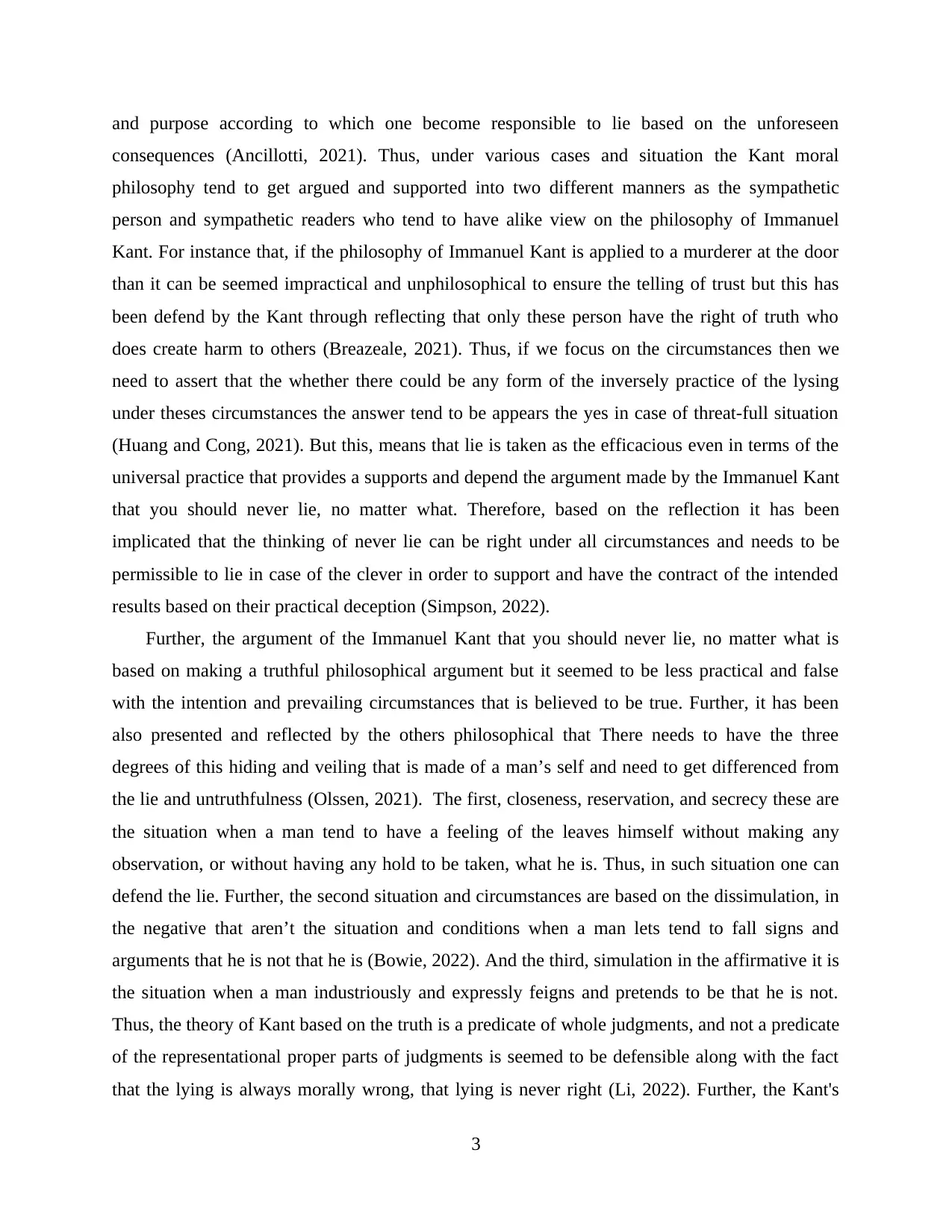
and purpose according to which one become responsible to lie based on the unforeseen
consequences (Ancillotti, 2021). Thus, under various cases and situation the Kant moral
philosophy tend to get argued and supported into two different manners as the sympathetic
person and sympathetic readers who tend to have alike view on the philosophy of Immanuel
Kant. For instance that, if the philosophy of Immanuel Kant is applied to a murderer at the door
than it can be seemed impractical and unphilosophical to ensure the telling of trust but this has
been defend by the Kant through reflecting that only these person have the right of truth who
does create harm to others (Breazeale, 2021). Thus, if we focus on the circumstances then we
need to assert that the whether there could be any form of the inversely practice of the lysing
under theses circumstances the answer tend to be appears the yes in case of threat-full situation
(Huang and Cong, 2021). But this, means that lie is taken as the efficacious even in terms of the
universal practice that provides a supports and depend the argument made by the Immanuel Kant
that you should never lie, no matter what. Therefore, based on the reflection it has been
implicated that the thinking of never lie can be right under all circumstances and needs to be
permissible to lie in case of the clever in order to support and have the contract of the intended
results based on their practical deception (Simpson, 2022).
Further, the argument of the Immanuel Kant that you should never lie, no matter what is
based on making a truthful philosophical argument but it seemed to be less practical and false
with the intention and prevailing circumstances that is believed to be true. Further, it has been
also presented and reflected by the others philosophical that There needs to have the three
degrees of this hiding and veiling that is made of a man’s self and need to get differenced from
the lie and untruthfulness (Olssen, 2021). The first, closeness, reservation, and secrecy these are
the situation when a man tend to have a feeling of the leaves himself without making any
observation, or without having any hold to be taken, what he is. Thus, in such situation one can
defend the lie. Further, the second situation and circumstances are based on the dissimulation, in
the negative that aren’t the situation and conditions when a man lets tend to fall signs and
arguments that he is not that he is (Bowie, 2022). And the third, simulation in the affirmative it is
the situation when a man industriously and expressly feigns and pretends to be that he is not.
Thus, the theory of Kant based on the truth is a predicate of whole judgments, and not a predicate
of the representational proper parts of judgments is seemed to be defensible along with the fact
that the lying is always morally wrong, that lying is never right (Li, 2022). Further, the Kant's
3
consequences (Ancillotti, 2021). Thus, under various cases and situation the Kant moral
philosophy tend to get argued and supported into two different manners as the sympathetic
person and sympathetic readers who tend to have alike view on the philosophy of Immanuel
Kant. For instance that, if the philosophy of Immanuel Kant is applied to a murderer at the door
than it can be seemed impractical and unphilosophical to ensure the telling of trust but this has
been defend by the Kant through reflecting that only these person have the right of truth who
does create harm to others (Breazeale, 2021). Thus, if we focus on the circumstances then we
need to assert that the whether there could be any form of the inversely practice of the lysing
under theses circumstances the answer tend to be appears the yes in case of threat-full situation
(Huang and Cong, 2021). But this, means that lie is taken as the efficacious even in terms of the
universal practice that provides a supports and depend the argument made by the Immanuel Kant
that you should never lie, no matter what. Therefore, based on the reflection it has been
implicated that the thinking of never lie can be right under all circumstances and needs to be
permissible to lie in case of the clever in order to support and have the contract of the intended
results based on their practical deception (Simpson, 2022).
Further, the argument of the Immanuel Kant that you should never lie, no matter what is
based on making a truthful philosophical argument but it seemed to be less practical and false
with the intention and prevailing circumstances that is believed to be true. Further, it has been
also presented and reflected by the others philosophical that There needs to have the three
degrees of this hiding and veiling that is made of a man’s self and need to get differenced from
the lie and untruthfulness (Olssen, 2021). The first, closeness, reservation, and secrecy these are
the situation when a man tend to have a feeling of the leaves himself without making any
observation, or without having any hold to be taken, what he is. Thus, in such situation one can
defend the lie. Further, the second situation and circumstances are based on the dissimulation, in
the negative that aren’t the situation and conditions when a man lets tend to fall signs and
arguments that he is not that he is (Bowie, 2022). And the third, simulation in the affirmative it is
the situation when a man industriously and expressly feigns and pretends to be that he is not.
Thus, the theory of Kant based on the truth is a predicate of whole judgments, and not a predicate
of the representational proper parts of judgments is seemed to be defensible along with the fact
that the lying is always morally wrong, that lying is never right (Li, 2022). Further, the Kant's
3
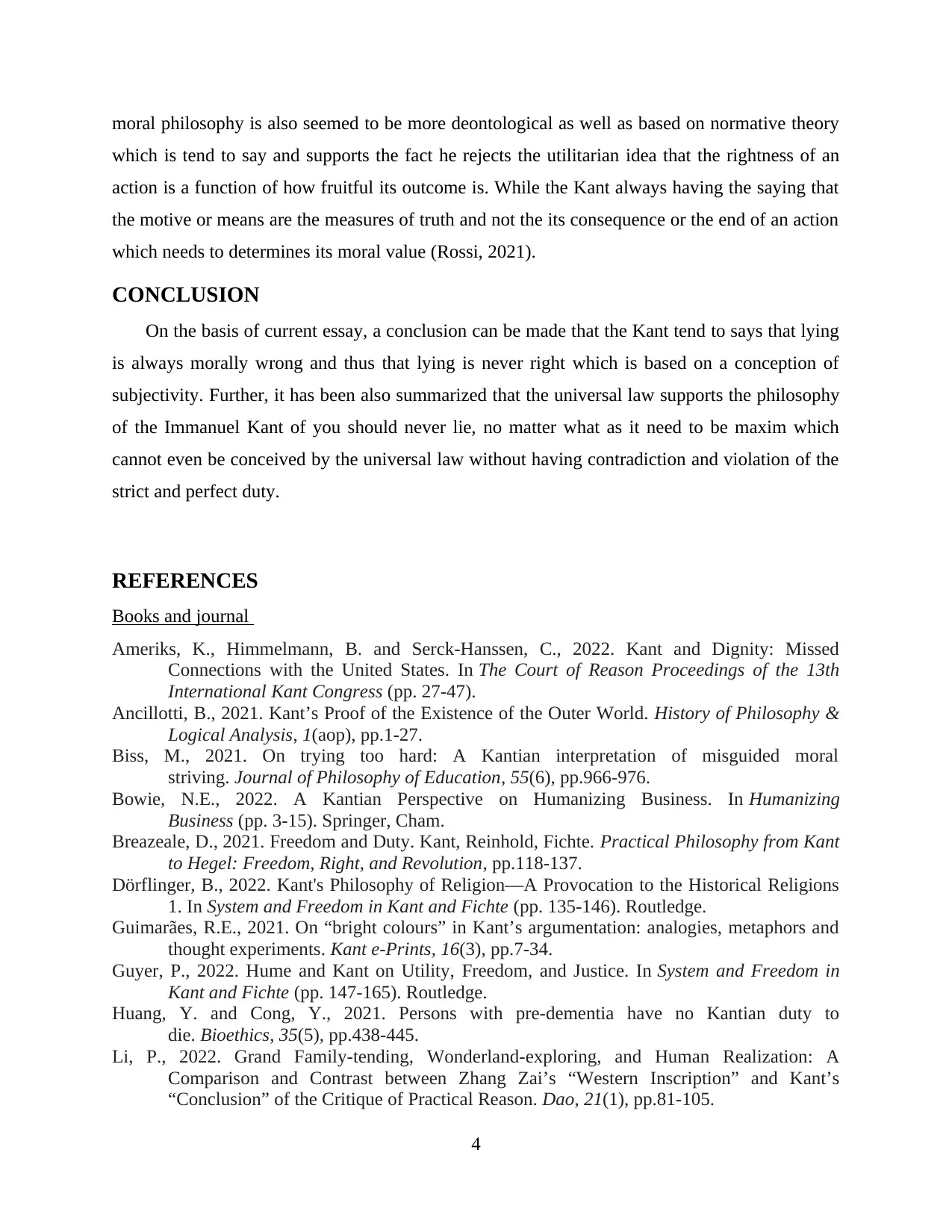
moral philosophy is also seemed to be more deontological as well as based on normative theory
which is tend to say and supports the fact he rejects the utilitarian idea that the rightness of an
action is a function of how fruitful its outcome is. While the Kant always having the saying that
the motive or means are the measures of truth and not the its consequence or the end of an action
which needs to determines its moral value (Rossi, 2021).
CONCLUSION
On the basis of current essay, a conclusion can be made that the Kant tend to says that lying
is always morally wrong and thus that lying is never right which is based on a conception of
subjectivity. Further, it has been also summarized that the universal law supports the philosophy
of the Immanuel Kant of you should never lie, no matter what as it need to be maxim which
cannot even be conceived by the universal law without having contradiction and violation of the
strict and perfect duty.
REFERENCES
Books and journal
Ameriks, K., Himmelmann, B. and Serck-Hanssen, C., 2022. Kant and Dignity: Missed
Connections with the United States. In The Court of Reason Proceedings of the 13th
International Kant Congress (pp. 27-47).
Ancillotti, B., 2021. Kant’s Proof of the Existence of the Outer World. History of Philosophy &
Logical Analysis, 1(aop), pp.1-27.
Biss, M., 2021. On trying too hard: A Kantian interpretation of misguided moral
striving. Journal of Philosophy of Education, 55(6), pp.966-976.
Bowie, N.E., 2022. A Kantian Perspective on Humanizing Business. In Humanizing
Business (pp. 3-15). Springer, Cham.
Breazeale, D., 2021. Freedom and Duty. Kant, Reinhold, Fichte. Practical Philosophy from Kant
to Hegel: Freedom, Right, and Revolution, pp.118-137.
Dörflinger, B., 2022. Kant's Philosophy of Religion—A Provocation to the Historical Religions
1. In System and Freedom in Kant and Fichte (pp. 135-146). Routledge.
Guimarães, R.E., 2021. On “bright colours” in Kant’s argumentation: analogies, metaphors and
thought experiments. Kant e-Prints, 16(3), pp.7-34.
Guyer, P., 2022. Hume and Kant on Utility, Freedom, and Justice. In System and Freedom in
Kant and Fichte (pp. 147-165). Routledge.
Huang, Y. and Cong, Y., 2021. Persons with pre‐dementia have no Kantian duty to
die. Bioethics, 35(5), pp.438-445.
Li, P., 2022. Grand Family-tending, Wonderland-exploring, and Human Realization: A
Comparison and Contrast between Zhang Zai’s “Western Inscription” and Kant’s
“Conclusion” of the Critique of Practical Reason. Dao, 21(1), pp.81-105.
4
which is tend to say and supports the fact he rejects the utilitarian idea that the rightness of an
action is a function of how fruitful its outcome is. While the Kant always having the saying that
the motive or means are the measures of truth and not the its consequence or the end of an action
which needs to determines its moral value (Rossi, 2021).
CONCLUSION
On the basis of current essay, a conclusion can be made that the Kant tend to says that lying
is always morally wrong and thus that lying is never right which is based on a conception of
subjectivity. Further, it has been also summarized that the universal law supports the philosophy
of the Immanuel Kant of you should never lie, no matter what as it need to be maxim which
cannot even be conceived by the universal law without having contradiction and violation of the
strict and perfect duty.
REFERENCES
Books and journal
Ameriks, K., Himmelmann, B. and Serck-Hanssen, C., 2022. Kant and Dignity: Missed
Connections with the United States. In The Court of Reason Proceedings of the 13th
International Kant Congress (pp. 27-47).
Ancillotti, B., 2021. Kant’s Proof of the Existence of the Outer World. History of Philosophy &
Logical Analysis, 1(aop), pp.1-27.
Biss, M., 2021. On trying too hard: A Kantian interpretation of misguided moral
striving. Journal of Philosophy of Education, 55(6), pp.966-976.
Bowie, N.E., 2022. A Kantian Perspective on Humanizing Business. In Humanizing
Business (pp. 3-15). Springer, Cham.
Breazeale, D., 2021. Freedom and Duty. Kant, Reinhold, Fichte. Practical Philosophy from Kant
to Hegel: Freedom, Right, and Revolution, pp.118-137.
Dörflinger, B., 2022. Kant's Philosophy of Religion—A Provocation to the Historical Religions
1. In System and Freedom in Kant and Fichte (pp. 135-146). Routledge.
Guimarães, R.E., 2021. On “bright colours” in Kant’s argumentation: analogies, metaphors and
thought experiments. Kant e-Prints, 16(3), pp.7-34.
Guyer, P., 2022. Hume and Kant on Utility, Freedom, and Justice. In System and Freedom in
Kant and Fichte (pp. 147-165). Routledge.
Huang, Y. and Cong, Y., 2021. Persons with pre‐dementia have no Kantian duty to
die. Bioethics, 35(5), pp.438-445.
Li, P., 2022. Grand Family-tending, Wonderland-exploring, and Human Realization: A
Comparison and Contrast between Zhang Zai’s “Western Inscription” and Kant’s
“Conclusion” of the Critique of Practical Reason. Dao, 21(1), pp.81-105.
4
⊘ This is a preview!⊘
Do you want full access?
Subscribe today to unlock all pages.

Trusted by 1+ million students worldwide
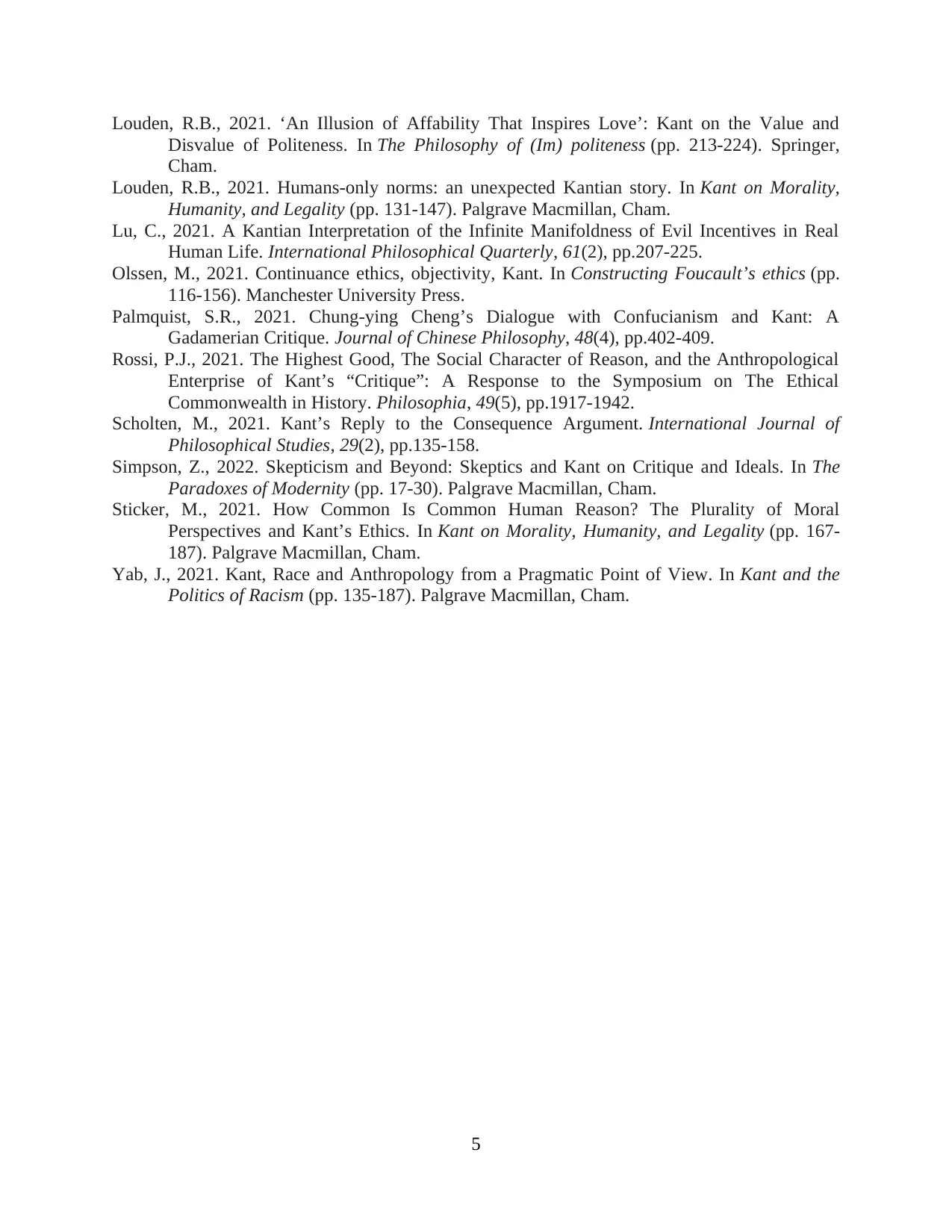
Louden, R.B., 2021. ‘An Illusion of Affability That Inspires Love’: Kant on the Value and
Disvalue of Politeness. In The Philosophy of (Im) politeness (pp. 213-224). Springer,
Cham.
Louden, R.B., 2021. Humans-only norms: an unexpected Kantian story. In Kant on Morality,
Humanity, and Legality (pp. 131-147). Palgrave Macmillan, Cham.
Lu, C., 2021. A Kantian Interpretation of the Infinite Manifoldness of Evil Incentives in Real
Human Life. International Philosophical Quarterly, 61(2), pp.207-225.
Olssen, M., 2021. Continuance ethics, objectivity, Kant. In Constructing Foucault’s ethics (pp.
116-156). Manchester University Press.
Palmquist, S.R., 2021. Chung-ying Cheng’s Dialogue with Confucianism and Kant: A
Gadamerian Critique. Journal of Chinese Philosophy, 48(4), pp.402-409.
Rossi, P.J., 2021. The Highest Good, The Social Character of Reason, and the Anthropological
Enterprise of Kant’s “Critique”: A Response to the Symposium on The Ethical
Commonwealth in History. Philosophia, 49(5), pp.1917-1942.
Scholten, M., 2021. Kant’s Reply to the Consequence Argument. International Journal of
Philosophical Studies, 29(2), pp.135-158.
Simpson, Z., 2022. Skepticism and Beyond: Skeptics and Kant on Critique and Ideals. In The
Paradoxes of Modernity (pp. 17-30). Palgrave Macmillan, Cham.
Sticker, M., 2021. How Common Is Common Human Reason? The Plurality of Moral
Perspectives and Kant’s Ethics. In Kant on Morality, Humanity, and Legality (pp. 167-
187). Palgrave Macmillan, Cham.
Yab, J., 2021. Kant, Race and Anthropology from a Pragmatic Point of View. In Kant and the
Politics of Racism (pp. 135-187). Palgrave Macmillan, Cham.
5
Disvalue of Politeness. In The Philosophy of (Im) politeness (pp. 213-224). Springer,
Cham.
Louden, R.B., 2021. Humans-only norms: an unexpected Kantian story. In Kant on Morality,
Humanity, and Legality (pp. 131-147). Palgrave Macmillan, Cham.
Lu, C., 2021. A Kantian Interpretation of the Infinite Manifoldness of Evil Incentives in Real
Human Life. International Philosophical Quarterly, 61(2), pp.207-225.
Olssen, M., 2021. Continuance ethics, objectivity, Kant. In Constructing Foucault’s ethics (pp.
116-156). Manchester University Press.
Palmquist, S.R., 2021. Chung-ying Cheng’s Dialogue with Confucianism and Kant: A
Gadamerian Critique. Journal of Chinese Philosophy, 48(4), pp.402-409.
Rossi, P.J., 2021. The Highest Good, The Social Character of Reason, and the Anthropological
Enterprise of Kant’s “Critique”: A Response to the Symposium on The Ethical
Commonwealth in History. Philosophia, 49(5), pp.1917-1942.
Scholten, M., 2021. Kant’s Reply to the Consequence Argument. International Journal of
Philosophical Studies, 29(2), pp.135-158.
Simpson, Z., 2022. Skepticism and Beyond: Skeptics and Kant on Critique and Ideals. In The
Paradoxes of Modernity (pp. 17-30). Palgrave Macmillan, Cham.
Sticker, M., 2021. How Common Is Common Human Reason? The Plurality of Moral
Perspectives and Kant’s Ethics. In Kant on Morality, Humanity, and Legality (pp. 167-
187). Palgrave Macmillan, Cham.
Yab, J., 2021. Kant, Race and Anthropology from a Pragmatic Point of View. In Kant and the
Politics of Racism (pp. 135-187). Palgrave Macmillan, Cham.
5
1 out of 7
Related Documents
Your All-in-One AI-Powered Toolkit for Academic Success.
+13062052269
info@desklib.com
Available 24*7 on WhatsApp / Email
![[object Object]](/_next/static/media/star-bottom.7253800d.svg)
Unlock your academic potential
© 2024 | Zucol Services PVT LTD | All rights reserved.





